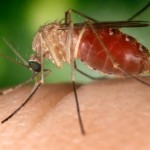The Illinois Department of Public Health has confirmed the state’s first case of human West Nile virus.
 A woman in her 70’s became sick in July, the Chicago Department of Public Health reported. Last year, a total of 117 cases were reported, including 11 deaths.
A woman in her 70’s became sick in July, the Chicago Department of Public Health reported. Last year, a total of 117 cases were reported, including 11 deaths.
West Nile virus has now been reported in 32 Illinois counties in birds, mosquitos or humans, the IDPH reports. At this time in 2013, 49 counties had reported West Nile virus. By the end of the year, 76 counties reported the virus.
Madison and St. Clair counties have each had six mosquito batches test positive for West Nile in 2014. Across the country, 124 human cases were reported as of Aug. 12, including seven deaths, according to the Center for Disease Control.
West Nile virus is transmitted through the bite of a mosquito that has picked up the virus by feeding on an infected bird. Common West Nile virus symptoms include fever, nausea, headache and muscle aches. Symptoms may last from a few days to a few weeks. However, four out of five people infected with West Nile virus will not show any symptoms. In rare cases, severe illness including meningitis or encephalitis, or even death, can occur. People older than 50 are at higher risk for severe illness from West Nile virus.
The IDPH recommends the three “R’s” as the best way to prevent West Nile disease.
- Reduceexposure – avoid being outside when mosquitoes are most active, especially between dusk and dawn.
- Make sure doors and windows have tight-fitting screens. Repair or replace screens that have tears or other openings. Try to keep doors and windows shut, especially at night.
- Eliminate all sources of standing water where mosquitoes can breed, including water in bird baths, ponds, flowerpots, wading pools, old tires and any other receptacles.
- Repel – when outside, wear shoes and socks, long pants and a long-sleeved shirt, and apply insect repellent that contains DEET, picaridin, oil of lemon eucalyptus or IR 3535, according to label instructions. Consult a physician before using repellents on infants.
- Report- In communities where there are organized mosquito control programs, contact your municipal government to report dead birds and areas of stagnant water in roadside ditches, flooded yards and similar locations that may produce mosquitoes.



